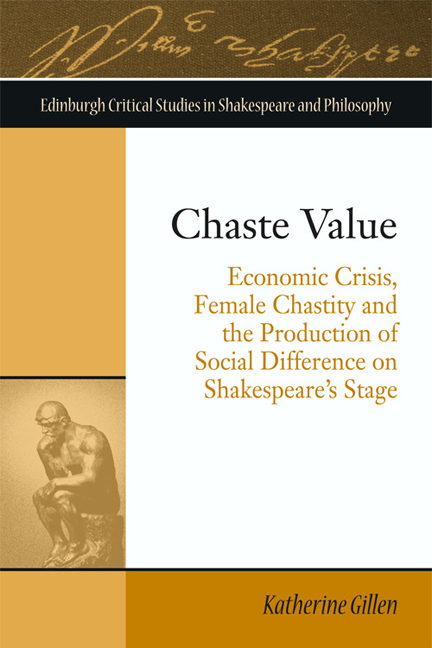 Chaste Value
Chaste Value Published online by Cambridge University Press: 22 December 2017
Whereas Measure for Measure, Pericles and The Revenger's Tragedy present chastity as a sign of economic, social and representational stability, characterised by the identity of essence and representation, William Shakespeare's Troilus and Cressida (1602), John Webster's The White Devil (1612), and Thomas Middleton and William Rowley's The Changeling (1621) all invoke commercial discourses to interrogate the concept of intrinsic chastity and in each case reveal it to be a social construct. Although written in different decades of the early seventeenth century, the three plays – tragedies or, in the case of Troilus, a semi-tragedy – dramatise the social and epistemological crises that arise from the recognition that market principles may be applied broadly, extending to evaluations of people. Each play presents a society in which market forces have disrupted traditional understandings of intrinsic value and, by extension, have destabilised the aristocratic supremacy that depends on this foundation. Female chastity proves particularly resonant in this context, as a commoditised virtue that also functions as the lynchpin of social and metaphysical hierarchies. Although this dynamic manifests differently in each play, Troilus, The White Devil and The Changeling all emphasise chastity's commodity potential in order to interrogate the constructed nature of value more generally and of aristocratic male selfhood in particular.
Chastity is often presented as a commodity in the conduct literature of the period. Richard Brathwaite in The English Gentlewoman, for example, warns women that ‘The way to winne an husband is not to wooe him, but to be woo'd by him. Let him come to you, not you to him. Profferd ware is not worth the buying. Your states are too pure, to bee set at sale; too happy, to be weary of them.’ Inclined to think in Aristotelian terms, early moderns worried that the intrinsic value of products could be obscured by exchange or by the artful presentation of merchants. Brathwaite points to this concern as it pertains to women, evincing anxiety about women's commoditisation in his depiction of them as ‘profferd ware’ and in his comment that chaste women are ‘too pure’ and ‘too happy’ to ‘bee set at sale’. Nonetheless, by situating women's desirability within dynamics of supply and demand, Brathwaite reflects women's commodity potential and suggests that women may, to some extent, manipulate their own value.
To save this book to your Kindle, first ensure no-reply@cambridge.org is added to your Approved Personal Document E-mail List under your Personal Document Settings on the Manage Your Content and Devices page of your Amazon account. Then enter the ‘name’ part of your Kindle email address below. Find out more about saving to your Kindle.
Note you can select to save to either the @free.kindle.com or @kindle.com variations. ‘@free.kindle.com’ emails are free but can only be saved to your device when it is connected to wi-fi. ‘@kindle.com’ emails can be delivered even when you are not connected to wi-fi, but note that service fees apply.
Find out more about the Kindle Personal Document Service.
To save content items to your account, please confirm that you agree to abide by our usage policies. If this is the first time you use this feature, you will be asked to authorise Cambridge Core to connect with your account. Find out more about saving content to Dropbox.
To save content items to your account, please confirm that you agree to abide by our usage policies. If this is the first time you use this feature, you will be asked to authorise Cambridge Core to connect with your account. Find out more about saving content to Google Drive.